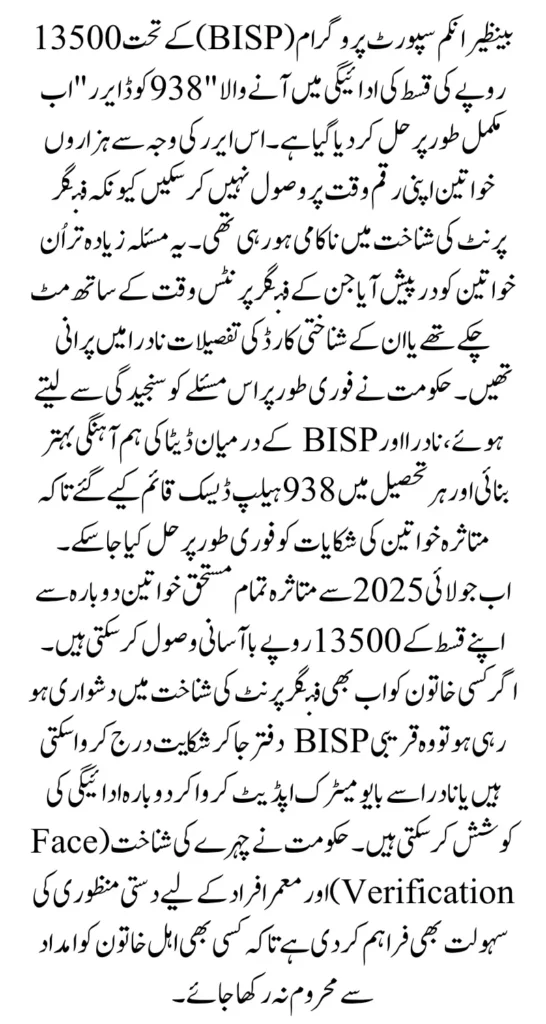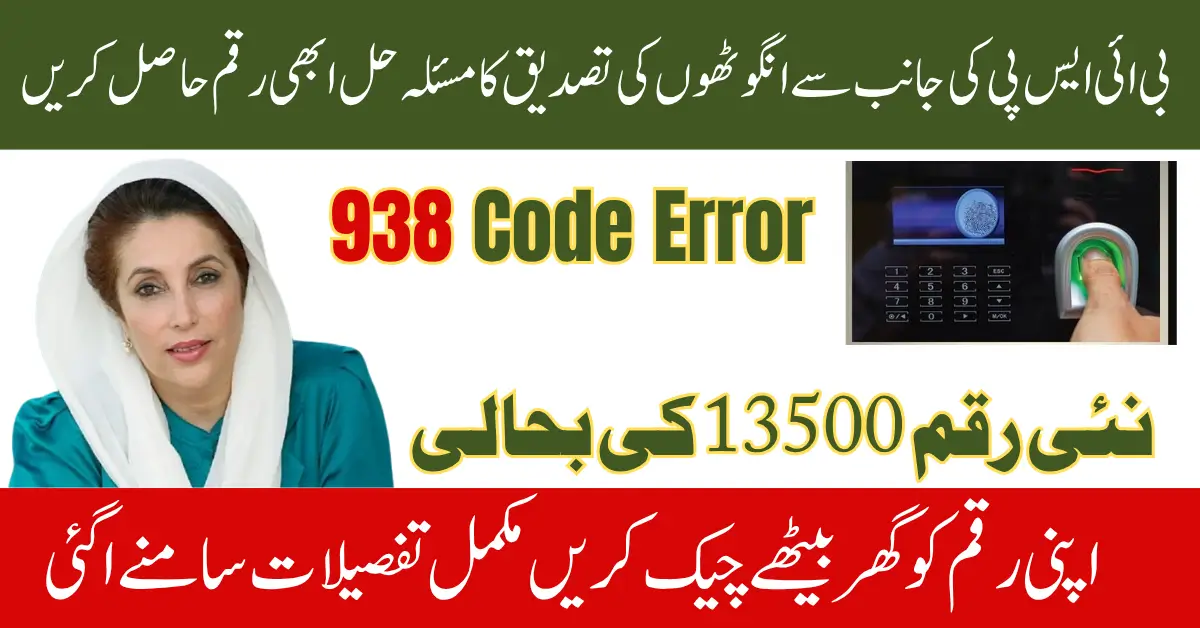BISP Fingerprint Issue Resolved
BISP Fingerprint Issue Resolved In recent months, thousands of BISP beneficiaries, especially women in remote areas, were left frustrated due to a technical error preventing the withdrawal of their ₨13,500 quarterly payments. The issue, known as the BISP 938 error, caused delays and confusion during fingerprint verification at payment centers. Many feared they were disqualified or removed from the program, which added unnecessary stress to already struggling families. Thankfully, the issue has now been officially resolved. From July 1st, 2025, payments have resumed for all affected recipients after technical fixes were implemented by the government and BISP authorities

The BISP 938 error was a system-generated error code that appeared when biometric verification failed during the withdrawal of payments. This typically occurred when the fingerprint data scanned at the payment center did not match the data stored in NADRA’s records. In most cases, this was due to worn fingerprints, poor-quality scanners, outdated CNIC data, or system syncing issues. The error was not an indication of disqualification — it was a technical mismatch between the beneficiary’s biometrics and the central database.
For rural women and elderly individuals, the error was especially common due to worn-out fingerprints from years of manual labor. Additionally, outdated CNIC records or changes in personal information that hadn’t been updated with NADRA also triggered this error. The result was an inability to withdraw the payment, even though the amount was approved in the system.
You Can Also Read: BISP 8171 June 2025 Double Payment 27000
Main Causes Behind the 938 Fingerprint Error
Understanding the common causes helps in preventing similar issues in the future. Here are the key reasons this error occurred:
- Biometric mismatch: Fingerprints did not match NADRA’s stored records.
- Outdated CNIC data: Personal information like address, marital status, or name not updated in NADRA.
- Faulty scanners and poor network: Broken fingerprint machines or slow internet at payment centers.
- Multiple failed attempts: Repeated fingerprint failures led to CNIC temporarily getting blocked.
- Unregistered mobile SIMs: Phone numbers not matching BISP database caused verification problems.
These problems combined to create a frustrating experience for many women, especially those who relied on the payment to cover basic household needs.
You Can Also Read: 8171 BISP Payment Message Not Received Best Alternative
How the Government Resolved the 938 Error Nationwide
The Government of Pakistan, in coordination with NADRA and BISP, took fast action to fix the growing issue. A multi-step plan was rolled out to identify the source of the problem and implement corrective measures. Specialized help desks were established in all tehsil-level BISP offices to handle the 938 complaints. NADRA was also instructed to speed up biometric re-verification services for affected individuals.
A technical task force was created to enhance the synchronization of data between NADRA and BISP databases. Payment partners, like HBL Konnect, were provided with improved fingerprint scanners. Furthermore, senior citizens and women with repeated biometric issues were granted manual approval, bypassing fingerprint requirements altogether.
You Can Also Read: 8171 Check Online CNIC 2025 New Payment
Steps Beneficiaries Were Told to Follow
To help the affected individuals, BISP outlined a simple step-by-step process:
- Step 1: Visit your nearest BISP Tehsil Office and submit a complaint about the 938 error with your original CNIC.
- Step 2: Go to a NADRA center for biometric re-verification and facial scan if necessary.
- Step 3: Wait 24–48 hours for your updated information to sync with BISP.
- Step 4: Try collecting your payment from a different BISP center with a working scanner.
- Step 5: Avoid making more than 3 attempts in a single day to prevent CNIC blockage.
By following these steps, most beneficiaries were able to restore access to their payments in a short period.
Payment Resumed in July Good News for Thousands
After weeks of technical work, BISP officially announced that the 938 code issue had been resolved, and payments would resume from July 1, 2025. All beneficiaries who were previously facing fingerprint-related issues can now visit their respective payment centers and withdraw their ₨13,500 without hurdles. Many women have already successfully collected their delayed payments, and those who haven’t yet are encouraged to do so as soon as possible.
If the fingerprint still doesn’t match at one center, beneficiaries are advised to try another payment point or revisit after biometric update. The system now includes updated scanners and better connectivity, which makes the process much smoother.
You Can Also Read: BISP Kafalat Program July 2025 Payments Phase
Tips to Avoid Biometric Errors in the Future
To ensure hassle-free payment withdrawal in the future, beneficiaries should follow these helpful tips:
- Rub your fingers lightly before scanning to increase fingerprint clarity.
- Do not apply lotions or creams before visiting payment centers.
- Always use the registered mobile SIM that was used for BISP registration.
- Try not to make more than three failed attempts in a row.
- Visit payment centers during non-peak hours (mornings or weekdays).
- Regularly update your CNIC and biometric data at NADRA.
By adopting these simple practices, the chance of encountering the 938 error again can be significantly reduced.
You Can Also Read: BISP 8171 Portal Reopening Date In July 2025
What to Do If the Issue Still Exists
While most issues have been resolved, a small number of cases may still face difficulties due to local equipment issues or missed biometric updates. In such cases, beneficiaries should:
- Call the BISP Helpline: 0800-26477 for guidance and complaint registration.
- Visit the Tehsil Complaint Desk with NADRA’s biometric update slip.
- Ask for manual verification or re-registration if fingerprint issues persist.
Officials are authorized to manually approve payment in cases where the system fails to verify due to consistent biometric failure.
Ongoing Government Initiatives for Better Verification
BISP and the government are working on long-term solutions to prevent future technical issues. Some of these include:
- Introducing face recognition for elderly and those with worn-out fingerprints.
- Upgrading the fingerprint scanners in all BISP and HBL Konnect outlets.
- Improving database syncing between NADRA and BISP in real-time.
- Training staff to manage technical complaints more efficiently.
These updates will ensure smoother, faster, and fairer payment disbursement to all registered beneficiaries.
Conclusion
The BISP 938 error was a widespread but temporary issue caused by technical mismatches during fingerprint verification. It affected thousands of deserving women, causing delays and confusion. However, the problem has now been successfully resolved through government action, NADRA cooperation, and system upgrades. From July 2025, all blocked or delayed payments have resumed, and eligible women can withdraw their ₨13,500 safely and easily.
By keeping your CNIC data updated, avoiding repeated failed attempts, and following best practices, you can ensure smooth access to your financial aid in the future. The government remains committed to providing uninterrupted support to the most vulnerable citizens of Pakistan.
You Can Also Read: BISP 17000 Payment Rahim Yar Khan District Distribution
FAQs
What is BISP 938 error?
It is a fingerprint verification error that occurs when your biometric data doesn’t match NADRA’s records.
Is the 938 error now resolved?
Yes, BISP has officially resolved the issue, and payments have resumed from July 2025.
Can I still get my ₨13,500 payment if I faced this error before?
Yes, beneficiaries whose payments were blocked earlier can now collect them after biometric update.
What should I do if my fingerprints still don’t match?
Visit NADRA for re-verification and then contact the nearest BISP office with your update slip.
Is face verification allowed for older people?
Yes, face verification and manual approvals are available for senior citizens or repeated biometric issues.


